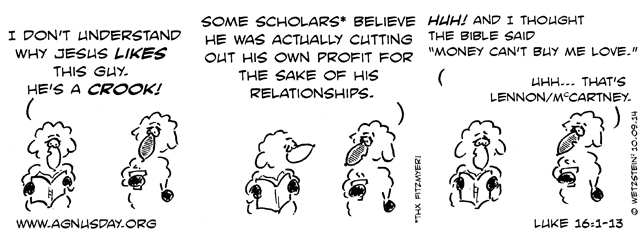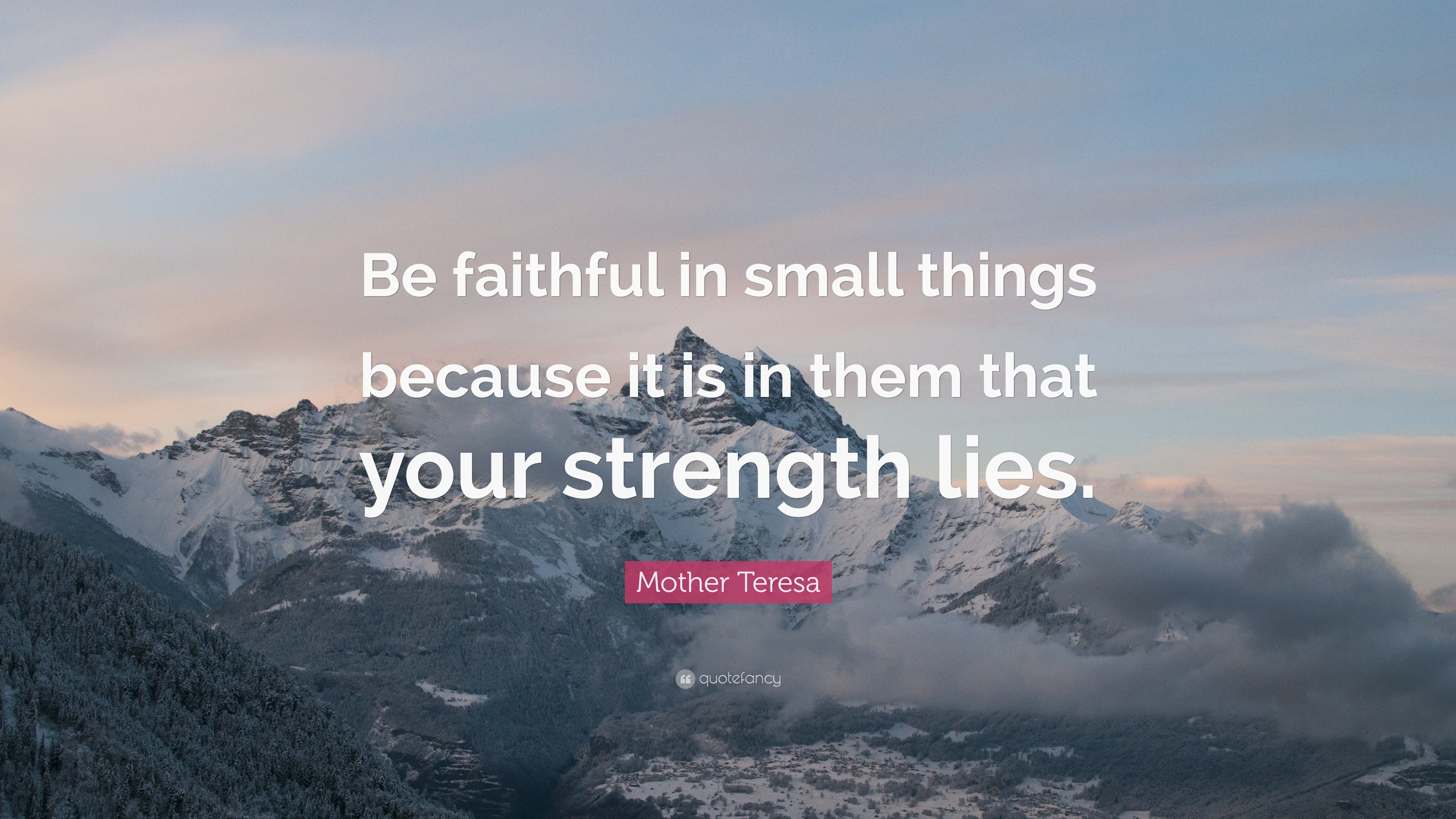Tainted love
Luke 16: 1-13
New Ark United Church of Christ, Newark, DE
September 18, 2016
 |
| Sukkah of the Signs by Mat McDermott |
For quite some time, many church folks and others have wondered why we still read the Bible, a book written by numerous human beings about their supernatural dealings with a seemingly mercurial God and an itinerant rabbi who sometimes tells stories that sound like he’s been sniffing frankincense at best and a lousy editing job at worst. This reading from the lectionary is one of those times.
Sometimes I feel I've got to
Run away, I've got to
Get away from the pain you drive into the heart of me
The love we share
Seems to go nowhere
And I've lost my light
For I toss and turn, I can't sleep at night
Run away, I've got to
Get away from the pain you drive into the heart of me
The love we share
Seems to go nowhere
And I've lost my light
For I toss and turn, I can't sleep at night
It’s
a parable that sounds like a
story from the business pages of the newspaper—a rags-to-riches-to-rags story. Someone from management has been taking from
the till and making off with it. The
owner of the company has heard from others about his manager and plans to fire
him. The manager, thinking only of
himself and his future, uses the shrewd mind that got him into this mess and
ingratiates himself with his boss’s debtors by discounting what they owe the
boss. It all makes sense until we get to
the end. The boss commends the crooked manager
because of his shrewdness.
Eugene Peterson, in his paraphrase The Message, explains it this way: “The master praised the crooked
manager! And why? Because he knew how to look after himself. Streetwise people are smarter in this regard
than law-abiding citizens. They are on
constant alert, looking for angles, surviving by their wits. I want you to be smart in the same way—but for
what is right—using every adversity to stimulate you to creative
survival, to concentrate your attention on the bare essentials, so you’ll live,
really live, and not complacently just get by on good behavior.”
When we get upset about this crooked
manager being praised for his shrewdness our sense of entitlement can kick
in. “I’ve worked hard, been honest, and
I don’t get any praise for doing what I’m supposed to do.” We sound like the older brother in the
parable about the prodigal son, just before this one. God’s grace sounds cheap in this story, as
though some are getting off easy for their sin.

The truth is we have all benefited from
God’s generosity. The truth is we all
have benefited from the ill-gotten gains of others. Most of us have comfortable lives with enough
to eat, a roof over our heads, some money in the bank, and all kinds of
material goods in abundance wherever we shop. Never mind where these goods are made, by whom
and the little they get paid, and at what price to the environment. What Jesus is asking us is: It’s not enough to get by on our good
behavior. What are we going to do with
this grace, this tainted love we have with money and faithfulness? Secure our own survival or use what we’ve
gained toward real life, authentic living for everyone, what Jesus called the
kingdom of God?
Now I know I've got to
Run away, I've got to
Get away, you don't really want any more from me
To make things right
You need someone to hold you tight
And you think love is to pray
But I'm sorry, I don't pray that way
Run away, I've got to
Get away, you don't really want any more from me
To make things right
You need someone to hold you tight
And you think love is to pray
But I'm sorry, I don't pray that way
The
relationship we have with money, or with anything or anyone for that matter, is
a reflection of the relationship we have with God and God’s kingdom. Or to put it another way, a reflection of the
relationship we have with wholeness, goodness, restorative justice, compassion,
unconditional love. Money is a tool, a
transaction, a symbol of what we value, and it can be used as a weapon, as
power, as mercy and kindness, as a means to whatever end we choose. But it’s important to remember that money is
a creation of empire. True riches come
from relationships and the life we live because of them.

Jesus
said that we should give to Caesar what belongs to Caesar and give to God what
belongs to God. But our relationships to
money and to God are not so easily divided.
God knows this. We know
this. Our love is hardly ever pure. We’re full of mixed motives, trying to secure
our own needs while trying to keep in mind the needs of others and the survival
of the planet.
Yet daily we can see how that
relationship is fairing. When it comes
to the earth and its resources, we human beings have behaved much like that
crooked manager. Maybe that’s why it’s
hard for us to get into this story. We
don’t like to see ourselves this way or be reminded of the damage we’ve done
and frankly, we’ve benefited from. Just
when we got industrial feet under us was when the earth began to warm in ways
it hasn’t since before recorded human history.
And yet it’s not clear how we’re going to survive this technological
adolescence into which we’ve evolved.
It’s not so much a supernatural God who’s going to fire us from our
managerial position, but rather an earth that won’t be able to sustain human
life, let alone the decreasing number of species that depend on it.
Jesus tells his disciples and us that we
need to use our wits, the shrewd behavior that got us into this mess, this
adversity, as a means of creative survival, to concentrate our attention on the
bare essentials so that we can live, really live, and not just get by on our
good behavior. The crooked manager, when
he discounted the debts owed to his master, he was forgoing his cut off the
top, but also creating a relationship between himself and those who were in
debt.
We are to do the same but for the right
reasons; not for our own survival, to secure our own future but also the future
of others. Many are joining our Native American sisters and brothers, as well as indigenous leaders from Hawai’i and
the Amazon in Ecuador—more than 200 tribal nations—to stand against the Dakota Access Pipeline in favor of that barest of essentials, water. Relationships are being made and renewed,
giving life and meaning to peoples our nation has severely wronged and
neglected.
Within the last fifteen years we have
seen the rise of nonprofit microlenders.
Small businesses here in the U.S. and around the world benefit not only
from small loans ranging from a few hundred to a few thousand dollars but also
from business and money management mentoring from the lender. Another rising trend is community credit
unions, which seek to serve low-to-moderate income families and
communities. Populations that usually
depend on payday lenders, like low-income wage earners and recent immigrants,
can now have access to safe financial services as well as financial education
and counseling.
How we spend our money and our lives
makes a direct impact on the kingdom of God, what Eugene Peterson calls living,
really living. I heard it once said that
people aren’t bad, but that we can make bad, sometimes catastrophic
decisions. Jesus is telling us that it’s
never too late to change our minds, change our ways: to decide for the kingdom of God, authentic
living rather than for material wealth and our own security.
Are
we going to sell all we have and give it to the poor? Probably not.
Are we going to give away our possessions and live an aesthetic
life? Maybe, maybe not. But maybe our rich God understands. Maybe our God is merciful as well as just,
even when we give our tainted love, our not-so-pure attempt at serving. God knows our relationships are conflicted
and yet God is hopeful anyway.
None
of us are going to change overnight. But
we could begin to do things a bit differently.
Rather than buy ourselves new clothes or shoes we could buy new clothes and
shoes for the clothing bank. Why should
the poor get only our hand-me-downs?
Instead of trading in the old car we could give it away to a charitable
organization. Like Dining for Women, instead
of going out to dinner, we could write a check for the same amount to the food
bank. This is a generous church. What would happen if we all raised our pledge
or giving by just a dollar week? We have
about 40 or so pledging givers in this church.
You do the math.
Is God disappointed with our tangled
attempts at discipleship? Maybe. But maybe God looks at our serving the way a
teacher looks at a student’s work: some
mistakes but that’s 70% of learning. God
looks for progress and for learning from our past ways.
God
is smart and shrewd with us. God is no
fool. God is willing to accept even our small
efforts as a sign of our faithfulness rather than nothing at all. God is looking for a goodwill effort; are we for
holistic and authentic living or not? Are
we willing to be a workshop for God’s kingdom or are we working against
it?
In
Jesus, God ran to us. But God will never
run from us. Even though the love we
give is often tainted, mixed, and conflicted, even though God has given us all
any god can give, God’s not going to pack her things and go. But we can’t love, we can’t serve God and
money at the same time. What God wants
to know is, who comes first in this relationship. Amen.




Comments
Post a Comment